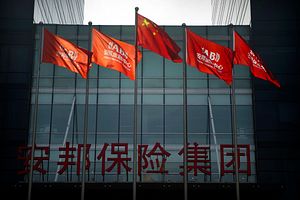Wu Xiaohui, 52, founder of Anbang Insurance Group — the Chinese financial conglomerate that purchased the luxury Waldorf Astoria hotel in New York in 2014 — went on trial in Shanghai on March 28. Wu was charged with fundraising fraud and embezzlement, involving massive sums of money. But based on incomplete summaries of a court transcript posted by the court, it’s unclear whether Wu pleaded guilty or not.
As The Diplomat has been closely following, Wu had been detained in China for unknown reasons since early June 2017. It was not until February 23 that the Chinese government finally confirmed to the public that Wu was being prosecuted for financial crimes. Meanwhile, the China Insurance Regulatory Commission (CIRC), together with China’s central bank, the China Banking Regulatory Commission (CBRC), the China Securities Regulatory Commission (CSRC), and the State Administration of Foreign Exchange (SAFE) officially assumed control of Anbang.
Wu’s case has been regarded as the Chinese government’s first big shot against the most lucrative field in China — the financial and economic sector — under the anti-corruption campaign launched by Chinese President Xi Jinping. In addition, Wu’s personal background — a once high-flying Chinese entrepreneur, ex-husband of Deng Xiaoping’s granddaughter, and a good friend of many of China’s princelings and foreign celebrities — gave a more sensational flavor to the story. Thus the case appears to be categorized as a “sensitive” one by the Chinese government.
Without any previous public notice, the Shanghai No. 1 Intermediate People’s Court suddenly announced Wu’s trial on its Weibo account on the day the trial opened.
Although the court claimed that it allowed media access to the trial, Financial Times reported that “Journalists were barred from the court building” and “[a] staffer from the Communist Party’s propaganda committee in Shanghai politely asked those who gathered outside the locked gate to leave.”
Yet in an attempt to show the court’s transparency and openness, the court posted incomplete summaries of the court transcript from early morning till late afternoon.
According to those summaries, the major accusation against Wu was that he had raised more than 65 billion renminbi ($10 billion) through fraud and diverted that money to other companies he controlled, for the purposes of “overseas investments, debt repayment, and lavish personal spending.”
Wu contested all charges against him, insisting that he did not know the law or whether his behavior had constituted a crime, according to the court’s summaries.
Then the prosecutors showed a series of evidence including the confessions of his own sister, his subordinates, and his colleagues.
The CIRC and the CBRC, in particular, jointly issued an administrative letter, demonstrating that Wu’s case has “caused serious harm to the society.”
A Chinese legal professional, who wishes to remain anonymous, told The Diplomat that if Wu is convicted, the penalty for his crime will be a life sentence, given the huge amount of money involved. But, the professional said, based on available information, it’s still arguable whether it’s proper to categorize Wu’s actions as personal rather than the corporate behavior of the company Wu ran.
However, the court’s summaries showed that by the end of this trial, Wu “expressed profound reflection and remorse for his crime.” He “thanked the judiciary organ for [its] help, education, and rescue and asked the court for leniency,” the summaries said. The court also posted a photo of Wu wiping his eye, as if wiping off his tears.
On the same day, Anbang’s Interim Management Working Group — run by the government — published a short statement on the company’s website, highlighting that Wu was on trial for his “personal crimes” and Anbang continues to “remain stable” with “sufficient cash flow.”

































